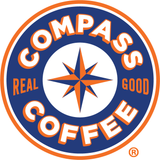This year, we celebrated Earth Day with these inspiring members of the Compass Community
Lauren Newman and her team at City Blossoms!
These community leaders embody our core value of "Build Your City"
To celebrate Earth Day this year, we checked in with Lauren Newman and Barbara Paulsen, two Compass customers working to make our communities more sustainable through education programs, urban gardens, and civic engagement. They both spoke about the ways they’re holding on to hope in the face of climate change this Earth Day and, remarkably, the many ways they’re relying on used Compass burlap bags to support them on their mission.
When I chatted with Barbara on the phone last Friday, I could hear the cranking of a dump truck dropping off 10 cubic yards of compost to the Marvin Gaye Greening Center where Barbara works.
“We are really focused on improving our soil as the most sustainable thing we can do,” Barbara said, “because there’s such an awareness of how important soil is to growing healthy plants.”
Located in Northeast DC, the Marvin Gaye Greening Center is an urban farm run by Washington Parks & People with a mission to bring inspiration and nutrition to the community. Barbara calls it a “communal garden,” a riff on the term, “community garden.”
“A lot of community gardens are places where people can come and have individual plots of garden to grow their own vegetables,” Barbara said. “This one, all of the vegetable and flower and herb beds are gardened for anybody in the community who (wants to) can work here and get vegetables and flowers and herbs from the garden.”
This year, Barbara helped plant lettuce, bok choy, broccoli, kale, lemon balm, spearmint, and rosemary, to name only a few. She and her team are also working to plant a pollinator garden filled with flowers so bees and other insects can help sustainably seed the farm each year.
Barbara’s Compass story begins and ends with compost.

A burlap coffee bag doing its new job in the garden!
“I realized that the key to making compost quicker is to have a high nitrogen ingredient to add to the compost to get it to heat up (so) it decomposes the materials so much more rapidly,” she said. “You can basically go from trash to compost in two months.”
In researching natural ways to do this, she learned that used coffee grounds are like a “magic ingredient.” So for the past two months, she’s been going to her local Compass café in Spring Valley four times a week to pick up used grounds. (She likes to drink a cortado or turmeric ginger latte while she’s at it!) As Barbara explained it, compost adds more microbes to the soil so the nutrients are more readily available to the plants. And children who visit the park to help out after school love to help check the temperature of the soil, watch the worms wriggle, and turn the compost.
“They’re very curious about where their food comes from,” Barbara said. “They love to get their hands dirty.”
As far as burlap bags go, Barbara uses them in two ways. Firstly, she folds them into containers to create grow bags (which are natural fiber flower pots) for plants like potatoes that like a really fluffy soil (which means, compost!). Alternatively, she places the burlap bags around the base of plants that require a little extra protection to grow. Lately, she’s been using the bags to care for her carrots, which need to be kept consistently moist.
“If it doesn't rain, they can dry out,” Barbara said. “So one way to keep them moist is to put this burlap over the seeds after you put them in. It keeps birds and other animals from digging up the seeds. And then also, when it does rain, or when I water them, the burlap absorbs the moisture. So it keeps the seeds wet enough for them to germinate.”
Lauren and her team over at City Blossoms also use the burlap bags to protect plants from unwanted visitors like birds and weeds, and ensure their seedlings get the right amount of sun and rain.
“Especially because the burlap is made from natural fibers,” Lauren said, “we can feel really good about letting it naturally biodegrade in our gardens.”
City Blossoms is a DC-based nonprofit with a long history of encouraging stewardship among youths. Lauren herself actually fell in love with urban agriculture over a decade ago when she was a youth participating in their programming.
“They’re true to their mission,” Lauren said, “which is: cultivating the wellbeing of our communities through creative programming and kid-driven gardens.”
While the organization works with “early growers” too, Lauren currently specializes in creating entrepreneurial opportunities for high schoolers, particularly in Eastern Senior High School on Capitol Hill and Cardozo Education Campus.
“We really meet students where they are,” Lauren said, “in their community, at their schools, in their safe spaces, to help them create these positive experiences outdoors.”




